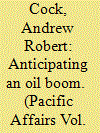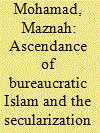|
|
|
Sort Order |
|
|
|
Items / Page
|
|
|
|
|
|
|
| Srl | Item |
| 1 |
ID:
098380


|
|
|
|
|
| Publication |
2010.
|
| Summary/Abstract |
By mid-decade, Cambodia will likely begin production of offshore oil fields containing an estimated 700 million to two billion barrels of oil and significant quantities of natural gas. This long anticipated event has prompted considerable discussion of whether petroleum-derived wealth will be a blessing or a curse. Much of the discussion has been framed through the lens of the "resource curse" thesis. The purpose of this article is to consider how the notion of a resource curse has entered the Cambodian political arena and to examine the questions it has prompted Cambodia's ruling elite and external actors to ask concerning the management of petroleum resources. Based on a systematic examination of the evolution of government policy, and of external attempts to shape its development, I show how warnings of a "resource curse" have come to be deployed in different ways by reform promoting aid donors, civil society groups, and the ruling elite. The article concludes by noting that while these warnings have helped to highlight risks associated with the rapid exploitation of petroleum resources, little will or capacity exists either domestically or internationally to transcend technical fixes to the pathologies of petroleum revenue wealth and to press for a more transparent exploitation regime.
|
|
|
|
|
|
|
|
|
|
|
|
|
|
|
|
| 2 |
ID:
098379


|
|
|
|
|
| Publication |
2010.
|
| Summary/Abstract |
Malaysia's trend of mounting religiosity should not be seen as merely stemming from political rivalry between its two biggest Muslim parties (UMNO and PAS) but also from another source, its Sharia-aspiring bureaucracy. The hegemony of this religious bureaucracy is based on its power as arbiter of the "right" or official Islam and its oversight over Sharia laws and Islamic public institutions. Insulated from voters' displeasure and, to a large extent through its strategy of invoking the immutability of Sharia, this bureaucracy has emerged as the lynchpin of Malaysia's state-driven Islamization. But even as Sharia proponents disavow secularism, the essence of Islamic legal and bureaucratic transformation is closer to a secularized adaptation than to a process of desecularization. Furthermore, as much as the bureaucracy is seemingly unstoppable, it is far from being fully stabilized as it confronts a dissenting section of the Muslim middle class who are also keen to capture the discursive, but highly fortified legal space of "authentic" Islam occupied by this bureaucracy. Ultimately, what surfaces in Islam's politicization is the contestation between a secularized Sharia bureaucracy and its juridical subjects, rather than a desecularization movement.
|
|
|
|
|
|
|
|
|
|
|
|
|
|
|
|
| 3 |
ID:
098378


|
|
|
|
|
| Publication |
2010.
|
| Summary/Abstract |
Over half a million ethnic Koreans found themselves in the post-Soviet states after the collapse of the Soviet Union in 1991. Caught up in the political and economic transformation of these countries, they faced the necessity of constructing their own strategies for survival and resettlement. Briefly explaining the formation of Russian Koreans' primary diasporas in their historical context and focusing on the diasporians' mobility in the post-Soviet era, this study will show how the destruction of the constraints of the authoritarian period together with the collapse of the regime itself affects diasporas and enlarges the spaces available to them. Addressing the issue of the diaporians' relationship to place and space, this article attempts to contribute to the conceptualization of the construction of new diasporic spaces and the discussion of mobility decision making, suggesting that diasporians, who had been long deprived by various constraints of the right to choose their place of residence, have comparatively high mobility and construct newer, much more sophisticated and far-flung diasporic layers.
|
|
|
|
|
|
|
|
|
|
|
|
|
|
|
|
| 4 |
ID:
098377


|
|
|
|
|
| Publication |
2010.
|
| Summary/Abstract |
Rather than focusing on either bounded conceptions of migrant assimilation or unbounded transnational linkages, this paper situates migrant experiences in broader "routes of identity." In the case of Malay ex-seamen in Liverpool, UK, all of whom are now in their seventies or eighties, this has meant tracing life geographies extending back well over half a century. During the middle decades of the twentieth century when these men arrived in Liverpool, the city was a major seaport with longstanding maritime connections to Southeast Asia and across the Pacific. Drawing upon fieldwork carried out in Liverpool and Southeast Asia between 2003 and 2008, the paper gives attention to four geographical dimensions of the shifting identities of Liverpool-based Malay ex-seamen: (1) the always-already fluid and mobile nature of their identifications which preceded long-distance migration; (2) shifting political geographies of identity (re)formation, particularly the establishment of post-colonial national boundaries which cut across prior modes of identification; (3) historically variable constitutive geographies of long-distance interconnection, most notably the transition from maritime socioeconomic networks to a post-maritime period; and (4) social sites through which individual and collective identities are emplaced. The intention is to sketch these four different dimensions in such a way as to allow them to speak critically to issues of transnationalism and migrant identity beyond the specific case of Malays in Liverpool.
|
|
|
|
|
|
|
|
|
|
|
|
|
|
|
|
|
|
|
|
|